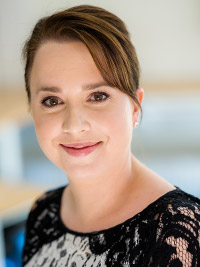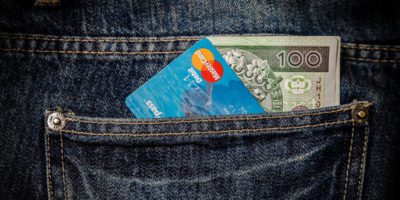Dr. Jodie Moll is a senior lecturer in accounting at the Alliance Manchester Business School. Her research interest lies in understanding the role of accounting in innovation and her current work involves identifying the kinds of management practices that can be used to help those undertaking research and development to take better calculated risks. Originally from Australia, Jodie is now UK based, having also spent time in the U.S. and Austria as a visiting lecturer.

“…You should take up opportunities and if you face a situation where you have self-doubt – be sure to do the hard work and prepare as best as possible. It would be a rare occasion for that preparation not to pay off…”
Choosing accounting because it forced me to think
Most young people probably think that success requires a clear understanding from a young age about what it is that you want to achieve. For some this may be true, but that was not the case for me. I entered university not knowing exactly what I wanted to do but that I enjoyed the challenge that accounting provided. It forced me to think.
It was only through personal experience that I began to understand where my passion for accounting lay. During my summers while at university I worked as an intern for a range of firms and that helped me to quickly figure out what I enjoyed doing the most. I have always thought if I was going to need to spend so much time working I should choose something I enjoy. It was through those experiences I realised how fascinating management accounting is because it is not subject to the same rules and regulations of other types of accounting and finance.
Developing a career path focused on lifelong learning
Following my undergraduate degrees I enrolled in a Ph.D. [Doctor of Philosophy] and during that period I taught several classes a week to help finance my studies. I found that I really enjoyed teaching. But, I also realised how fortunate I was to be developing a career path that was focused on lifelong learning.
When I finished my Ph.D. I took up a lecturing position at Griffith University, Australia. Shortly afterwards I was offered a lectureship in the Accounting and Finance Division at the University of Manchester. The Accounting and Finance Division had an excellent research reputation and so I availed of the opportunity to learn from and work from others and I accepted the job. In hindsight, the experiences this job has provided me have exceeded any expectations I had.
Innovation in how accounting is used
My research interests have changed throughout my career as a reflection of the changing business landscape. Today, I am particularly interested in innovation in how accounting is used, in particular in spaces where perhaps it isn’t known to have played a significant role in the past.
For instance, at the moment I am enjoying trying to understand its role in research and development processes. There are many fascinating industries that are doing cutting edge research, but there is also a lot of R&D spending that is wasted. My research is therefore focused on uncovering some of the novel ways that accounting is helping firms to manage the risks of R&D. The great thing about choosing an academic career is that I get to work on research topics that are of interest to me. You can’t say that about many jobs!
Many organisations think that the role of accounting in innovation is limited to the budget, however it has the potential of helping organisations to make calculated decisions. It can help them understand when to divest and when to accelerate investment. It can help them to address issues related to R&D and strategy.
Leading edge innovation in tech fields such as semiconductors can cost upwards of a $1bn. This makes it critical for companies to re-examine whether there is a role for accounting and accountants to help improve R&D processes. It is also critical these days because so much R&D is undertaken in partnership with other organisations. Accounting information provides a basis for mediating the relations between firms working together.
Working as an academic: Variation and autonomy
The nature of the job means that there is a lot of variation in what I do. I am not sure I could say there is a ‘typical’ work week but my job is intended to focus on three broad activities: (1) research; (2) teaching; and (3) administration. My goal is to try to do my best at everything I work on, but of course any job requires you to make trade-offs in terms of priorities.
I can be teaching a class of 300 students, meeting with a Ph.D. student, sitting in a School Executive Committee meeting, or working on a research project. It isn’t a typical 9-5 job. You have to be in the classroom at certain times and attend certain meetings but how you spend the rest of your time is up to you.
Of course, there are certain expectations for research output so you need to be disciplined when it comes to how you manage your time. I also review papers for several academic journals and that type of activity usually needs to be done on weekends etc. Getting a good work / life balance is a constant juggling act!
Leaving Australia to work in the UK
I had never been to the UK before accepting the job at the University of Manchester. When I was a teenager I did a year exchange in Canada. From that I developed a passion for travel. Moving to the UK was a way that I could continue to travel, but I also realised how fortunate I would be if I could learn from some of the most highly regarded academics in the field.
I had met one or two academics from the University of Manchester during my studies and they also had some influence on the decision to move here. Originally I was planning on moving to the UK for two years, but here we are more than ten years later so that risk paid off!
Putting myself out of my comfort zone teaching in the U.S. and Austria
I am always looking to develop my capabilities. The U.S. opportunity came about through a discussion with my mentor at the time. We were doing some research in the semiconductor industry and living in the U.S. made the firms more accessible.
Teaching in Austria came about through a request from the University. I have also taught on an academic leadership programme in Mexico which I feel provided me with the opportunity to see how accounting is taught elsewhere. It also helped me to understand the opportunities for research in such places.
It is really important to put yourself out of your comfort zone. Even the most confident person has self-doubt and has faced failure and set-backs. We all face challenges in our daily lives, but it is only through putting yourself in new situations that you learn about your own strengths and weaknesses. These are important occasions for building one’s confidence.

You should take up opportunities and if you face a situation where you have self-doubt – be sure to do the hard work and prepare as best as possible. It would be a rare occasion for that preparation not to pay off. It may not be immediately, but you will create an impression in the minds of others about how diligent you are and you are likely to gain some self-confidence in the process.
The best advice I’ve been given
(1) If you have a question ask it. I have developed a small network of people whose advice I value. When I have self-doubt I ask them for their opinion. I don’t always take it but it helps me to get a broader sense of the issue that I am trying to resolve. I think that women often are afraid to ask and they sit back hoping someone else will ask them if they have questions or issues that they would like to discuss.
(2) Learn to say ‘no’. This last piece of advice is not one that I am good at myself, because I tend to think of all sorts of things as ‘opportunities’ but in reality sometimes they are taking time away from my core priorities. It is something I am working on!
On the horizon for me, the Alliance Manchester Business School, my students and my research
It is a very exciting time! I have several students finishing their Ph.D.s. In terms of my own research I have been spending some time in the field collecting data. I really enjoy interacting with people that ‘do’ accounting. I learn so many surprising things about it! And, of course it helps to make my teaching more interesting because I have current real-life examples to draw on when illustrating the merits of a particular accounting tool.
The Alliance Manchester Business School is currently celebrating its 50th year which is a great achievement. It is interesting to reflect on how many academics have in one way or another a history with the accounting and finance division.
http://www.mbs.ac.uk/research/people/profiles/jmoll
https://www.linkedin.com/in/jodiemoll
https://www.linkedin.com/company/manchester-business-school





